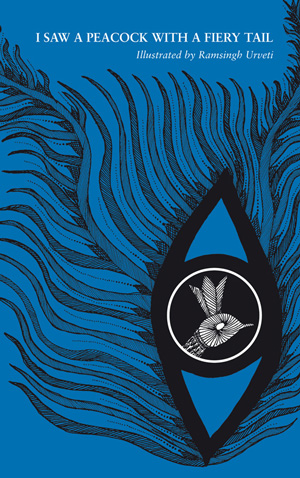Writer: Unknown
Illustrated by Ramsingh Urveti
Designed by Jonathan Yamakami
I first read this poem in some
dusty school library, and remember being both utterly charmed by the powerful, somewhat
surreal imagery, of its words, and befuddled by its meaning. Nonetheless, this and the equally befuddling ‘Romance’ (“..Chimborazo, Cotopaxi; took me by the hand…”) were the two mainstays of my mystical poetry-obsessed teen
years. Written in the 17th century by an English poet who has never
been traced (which only increases the poem’s air of romance and intrigue,
methinks), I Saw… is a form of trick
verse, its meaning evident only to those smart enough to decipher the pattern within it. I subsequently learnt that I Saw... was a popular folk poem. Yet for some reason, the poem has always conjured up images of
India in my head ( peacocks with fiery tails, raging seas, elephantine ants) ,
and I always imagine its anonymous creator being some English sahib or memsahib in a distant outpost
of the British Raj, struggling to verbalize their enormous fascination with India.
With a feathered quill, of course, in the flickering light of a paraffin lamp, while
in the dusty, heat-smothered background, a puny punkha boy slowly loses his duel
with the Indian summer .. But as always, I digress.
My overly extended point here is that this is probably why Tara Books’ version of the poem feels so right – it marries
the verses with distinctively Indian visuals. The book stars the stunning
black-and-white illustrations of Gond artist Ramsingh Urveti and, coupled with Brazilian
graphic designer Yamakami’s innovative design, they bring the poem – and its
secret – to life. Sly die-cut perforations on each page, along with some truly
ingenious layouts utterly change the way one reads the poem. I enjoyed the way
the book literally puts ‘the controls’ in the hands of the reader, allowing one to read it either one page at a time or in pairs, revealing the poet's trick.
My one grouse - A brief write-up
in the beginning of the book explains the trick in the verses, which is rather
a party pooper. Moving it to the back of the book would at least have given the
reader a chance to browse through the poem and attempt to ‘crack the code’
herself. Some of the mystery of the book is lost when you approach it
forewarned. Still, this is a book one is compelled to return to time and again,
for the lush detail of the art on each page, and the timeless beauty of its
words.
Do check out this interview with Jonathan Yamakami for an insight
into the production of the book. Even more praise, here.
Signature: Patterns in Gond Art
Artists: Various
Edited by Gita Wolf, Bhajju Shyam and Jonathan Yamakami
Ramsingh Urveti is one of several Gond artists featured in the
beautiful Signature: Patterns in Gond Art, a fascinating look at the
creative processes that drive their art. Now Gond art, like most other forms of
tribal Indian art, is based on decorative motifs and symbols, often repeated in
different combinations and scales, to create dense ‘textures’ in the painting. What is
perhaps unique to Gond art is the fact that each artist, over time, develops a
distinctive ‘signature’- a distinct motif that features prominently in their
work, inspired from their own observations of the world around them. So Kala
Bai Shyam uses an intricate weaving pattern like the threads in cloth, to
depict a lizard’s scales, while the semicircular marks that Sunitha Shyam sees
in the dung plaster on the walls of her home, become integral to her art. Fish
scales inspire Gangotri Bai Tekam, while the marks of the plow tilling the earth transform into motifs in Mansingh Vyam’s painting.
Leaves, water drops, footprints, ears of
corn – everything inspires pattern and finds its place in Gond art.
Also designed by Jonathan Yamakami, the book's minimalist page layouts allow the art to speak for itself. Signature is a fascinating resource on tribal art. Its also a good book for the novice artist, as it encourages you to seek creative inspiration in the ordinary everyday.
Also designed by Jonathan Yamakami, the book's minimalist page layouts allow the art to speak for itself. Signature is a fascinating resource on tribal art. Its also a good book for the novice artist, as it encourages you to seek creative inspiration in the ordinary everyday.




No comments:
Post a Comment